Mediation & Conflict Resolution
The Americans with Disabilities Act of 1990 and the Americans with Disabilities Amendment Act of 2010 are civil rights laws that extend to persons with disabilities, protecting them against discrimination. It is similar to other civil rights laws which are in place to protect from inequity on the basis of race, sex, religion, and national origin. Specifically, the ADA protects against disability-based discrimination in employment, access to government and business services, transportation, and telecommunications.
In 1992 the state of Rhode Island adopted mediation as its internal ADA complaint resolution procedure. All disability discrimination complaints filed against state departments, agencies, boards, etc. for administrative relief proceed through a two-step mediation process. Complainants may file directly with the Equal Employment Opportunity Commission (EEOC), the U.S. Department of Justice (DOJ), other federal departments’ civil rights offices, or the Rhode Island Commission for Human Rights.
In 1994 the General Assembly authorized the Governor’s Commission on Disabilities to offer its mediation services, free of charge, to parties involved in disability discrimination complaints involving private businesses, not-for-profit organizations, employers, and local government agencies, on a voluntary basis. The goal of mediation is to have all parties come to a mutually acceptable resolution.
What is Mediation?
Mediation attempts to resolve disputes between parties with the assistance of professionally trained mediators. The mediators help the parties to:
- Clarify relevant issues
- Identify areas of disagreement
- Explore solutions
- Develop a workable plan for the resolution of the disagreement
Through the process of mediation, the mediators help the disputing parties focus on shared interests that can lead to creative and cost effective solutions.
Why Mediation?
The mediation service provided by the Commission has proven to save time and money for all parties involved in a dispute. Mediation:
- May offer you a fast resolution of your dispute
- May be less expensive than going to court
- May mend your relationship with the other parties
- Still allows you to go to court if you cannot reach a mutually acceptable solution
What you need to do if you have a complaint
If you believe you are or have been involved in a discrimination issue, contact the RI Governor’s Commission on Disabilities at (401) 462-0102. The Commission is located at 2 Cherry Dale Court, in Cranston. Upon receiving the complaint, the Commission will offer mediation as an alternative to the traditional adjudication method, and will explain the difference between the two. If you agree to attempt mediation and return the mediation questionnaire, the business, non-profit organization, or the local government agency with which you are having the dispute is contacted. The mediation option is explained, and if the other party agrees, then the mediation session is scheduled at a convenient time and place.
What if the other party is not willing to participate?
- RI General Law 42-51-6 (a) and (c) proclaims that the state will make every effort to protect the rights of individuals with disabilities. All state agencies that have complaints filed against them are required by law to take part in mediation.
- RI law does not mandate non-state agencies to participate in mediation; however, the Commission does offer its mediation service to attempt to resolve these disputes. Discrimination complaints are heard by the RI Commission for Human Rights.
Please Note: It is NOT the function of the mediation program or the mediator to give legal advice. It is at each party’s discretion whether to have legal counsel or another advocate present during the mediation session.
